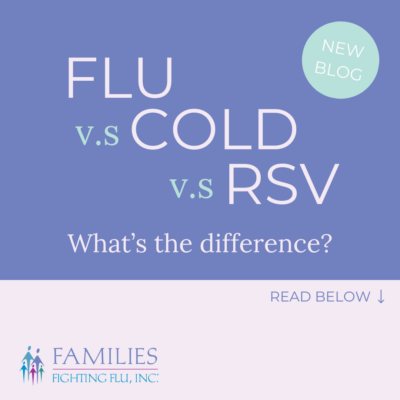
- Flu Vaccine Information
Flu vs. Cold vs. RSV: What’s the Difference?

It can be confusing to tell the difference between the flu, the common cold, and RSV (Respiratory Syncytial Virus). These illnesses share certain symptoms, but understanding their differences is crucial for effective prevention and management. Below, we explore the differences between them while emphasizing the importance of flu vaccines as the most effective preventive measure against the flu.
How Do You Know If You Have the Flu?
The flu, or influenza, is a contagious respiratory illness caused by influenza viruses. It can affect anyone, from children to the elderly, and can lead to severe complications, hospitalizations, and even death. Understanding flu symptoms and flu statistics can help you appreciate the significance of vaccination.
Some common flu symptoms include:
- Fever or chills
- Cough
- Sore throat
- Runny or stuffy nose
- Muscle or body aches
- Headaches
- Fatigue
- Nausea or vomiting (more common in children)
- Diarrhea (more common in children)
While most people who get flu will recover in a few days to less than two weeks, some people will develop complications as a result of flu which can be life-threatening and even result in death. Complications can range from mild to severe, such as pneumonia, bronchitis, and sinus infections, especially in individuals with weakened immune systems. These symptoms typically come on suddenly.
It’s important to know when to seek medical attention and ask for a flu test. Find out when you should seek medical attention here.
Distinguishing Flu Symptoms from the Common Cold
Now that we understand the flu better, let’s differentiate it from the common cold. While both illnesses share some symptoms, the common cold is typically milder and rarely leads to severe complications. According to the U.S. Centers for Disease Control and Prevention, it can be caused by a number of different viruses, including rhinoviruses, parainfluenza, and seasonal coronaviruses. Common cold symptoms can include a runny or stuffy nose, sneezing, and a mild sore throat. Fever is uncommon with a cold, whereas it’s a hallmark flu symptom.
RSV: Another Respiratory Challenge
RSV primarily affects young children and can lead to bronchiolitis or pneumonia in severe cases. Its symptoms overlap with those of the flu and cold and include coughing, sneezing, fever, and difficulty breathing. While RSV can affect people of all ages, it can be particularly dangerous for infants and older adults.
Preventing Yourself from Becoming a Flu Statistic: The Role of Vaccination
The best defense against the flu is vaccination. The flu vaccine is a proven and effective way to protect yourself and those around you from this potentially severe illness. Here’s why flu vaccination should be a top priority:
Reducing the Spread: Vaccination helps create herd immunity, reducing the overall spread of the virus within the community.
Protecting Vulnerable Populations: High-risk individuals, such as young children, the elderly, and those with chronic illnesses, are more likely to experience severe flu-related complications. Vaccination helps protect them.
Minimizing the Healthcare Burden: A reduction in flu cases can ease the burden on healthcare systems, ensuring that medical resources are available for those in severe need.
Preventing Severe Illness: Even if you contract the flu after vaccination, your symptoms are likely to be milder, reducing the risk of complications and hospitalization.
In the battle against respiratory illnesses like the flu, the common cold, and RSV, knowledge is your strongest ally. While these illnesses share similarities, they also have distinct characteristics.
However, when it comes to the flu, the most effective preventive measure is crystal clear: get vaccinated. Doing so not only protects yourself but also contributes to the overall health and well-being of your community.
Don’t wait! Get your flu shot today and be part of the solution.
Learn More About Fighting the Flu
Families Fighting Flu educates about the seriousness of influenza and the importance of annual vaccination so that no one suffers serious flu complications or death. Learn more about our mission and resources here and empower yourself to stay healthy this flu season.


